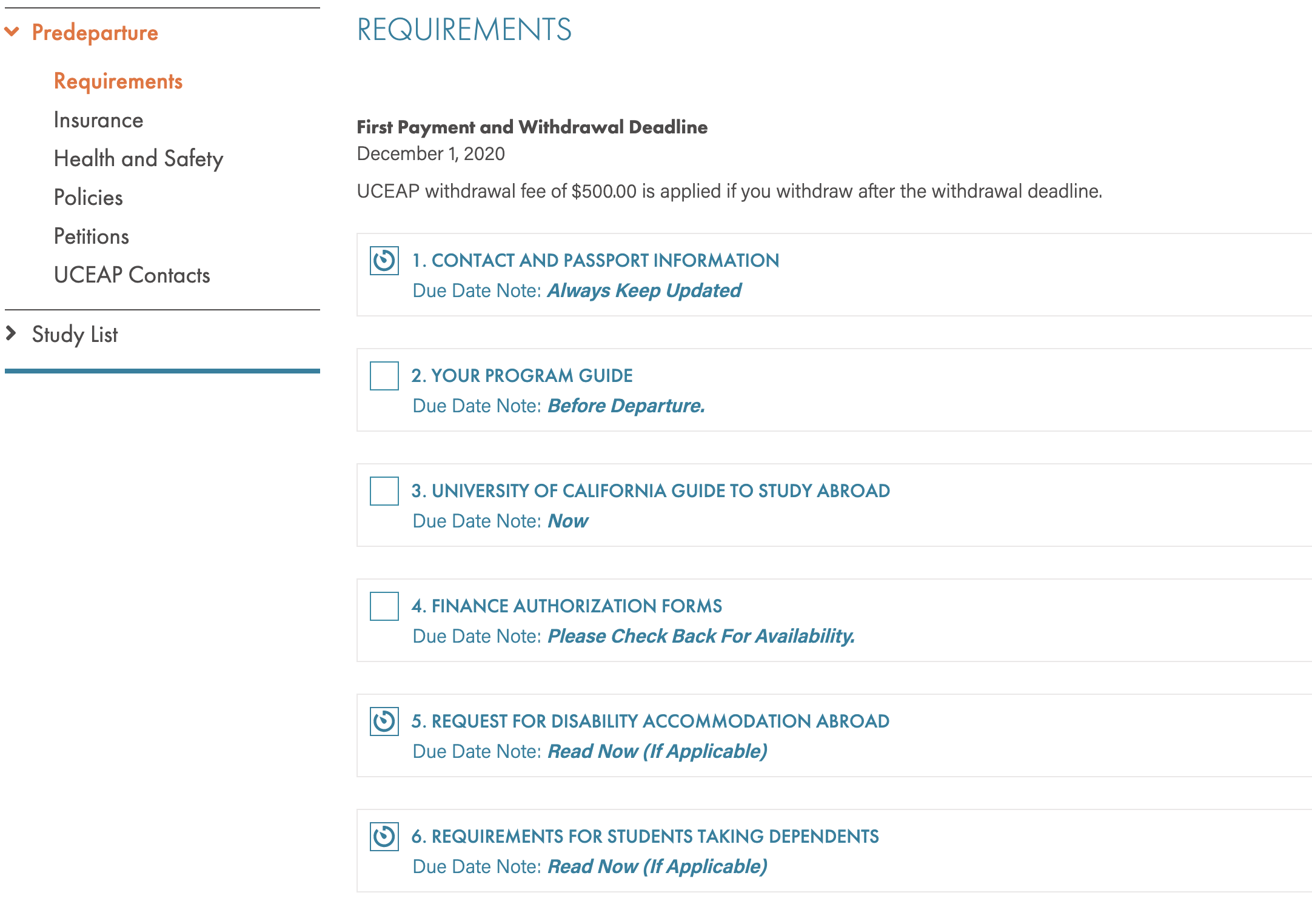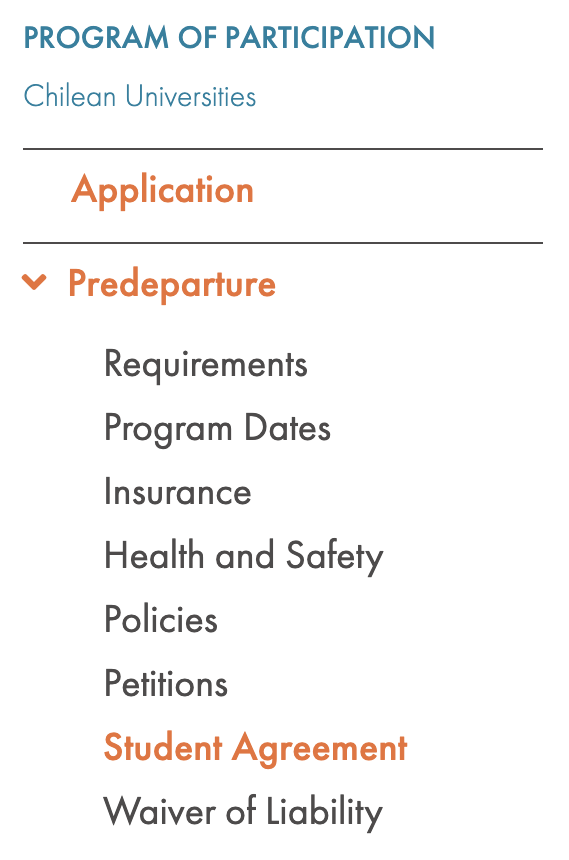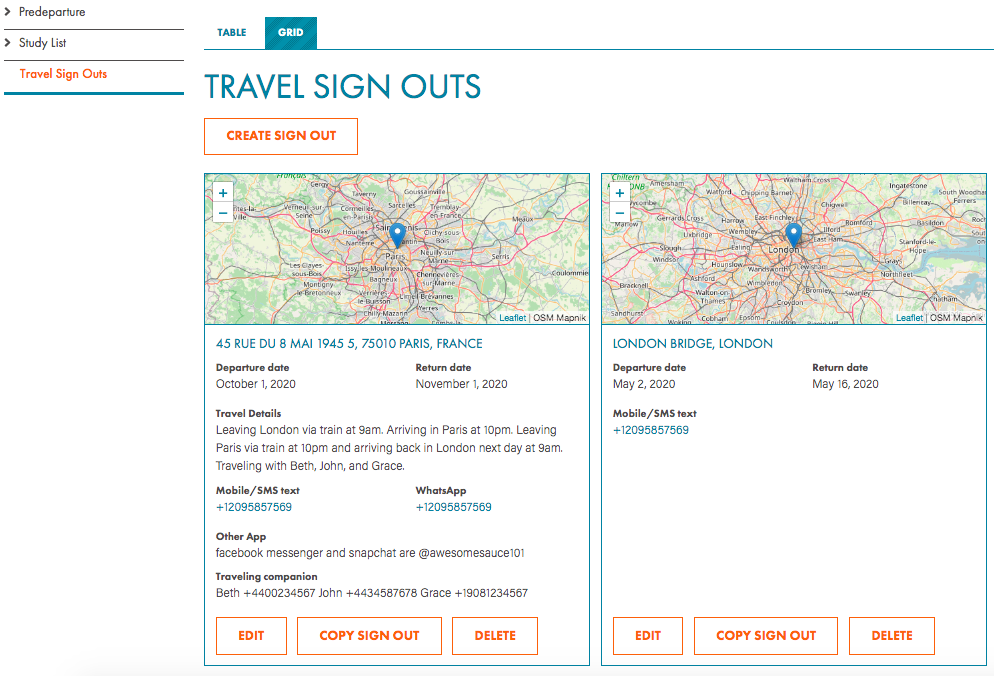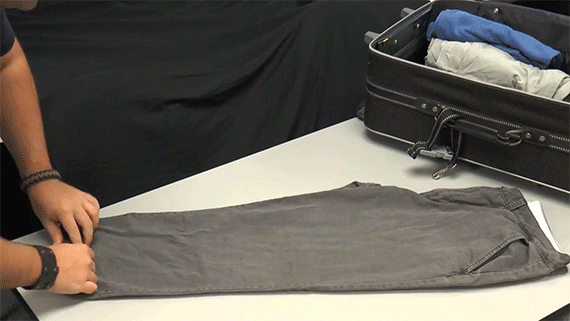Travel & Logistics
As you have probably realized, there is quite a bit to do before you depart. Beyond various considerations (e.g. health, safety, finances), there are some very practical items you need to handle as well.
Travel Documents
Passports
All students must have a valid passport in order to study outside the U.S. If you do not already have a passport, apply immediately. Your passport should remain valid for at least 6 months after the end date of your program. However, some programs may require your passport be valid as long as 18 months beyond your program end date. If your passport expires before that time, you will need to renew it before departure. Consult your UCEAP Predeparture Requirements checklist or with your study abroad advisor about passport duration and country-specific entry requirements.
Passport application forms are available from any post office that serves as a Passport Acceptance Facility or on the Department of State website. For UC Merced students, the Merced Country Registrar of Voters and the Merced County Law Library both offer passport services. If you are outside the Merced area, check the Department of State website to locate the nearest Passport Acceptance Facility. The application process typically takes 6-8 weeks; however, for an extra fee you can have your application expedited. Passport applications, instructions, and approximate processing times are available online.
It is recommended that you make several photocopies of your passport and to keep them in separate locations as well as uploading a copy to the MyStudyAbroad Portal. This way, if you lose your passport when abroad, you will have a record of your passport number and other information that will help to expedite a replacement abroad. Leave one copy of your passport with an emergency contact at home and another copy with you but separate from your actual passport. If possible, scan and upload your passport and visa so they are accessible electronically while abroad.
Passports can be uploaded in the MyStudyAbroad Portal by navigating to the Profile tab and then by clicking Upload File icon under Passport Copy.
You must also update the UCEAP Portal with your passport information. Make sure your name matches the spelling on your passport, including initials, middle names, etc. If your name in your UCEAP application differs from your name on your passport, notify your study abroad advisor immediately. Check your UCEAP Predeparture Requirements checklist for additional requirements.
Check out the blog post, "Lost Passport Abroad? Here's What to Do" in the California Abroad.
Visas or Entry Requirements
A visa (entry clearance) is an endorsement; it may be an actual stamp or sticker placed in your passport by the immigration authorities of the host country, or it may be issued to you electronically. A visa grants its bearer permission to enter and travel within a host country for a specific purpose and timeframe. A valid passport is needed to apply for a visa.
Example of an Italian study visa
Each country has different entry requirements. If your host country requires a student visa for your program prior to arrival, do not enter the host country without one, even though you may be able to enter as a tourist. Once abroad, it can be difficult, even impossible, to obtain the necessary student visa. Some countries allow students to enter with a residence permit or to apply for a visa upon arrival. It is your responsibility to understand and verify any entry requirements prior to arrival.
A visa is a privilege, not a right. The government of the host country either issues or denies a visa. A host country reserves the right to deny students entry and sets strict rules for obtaining student visas or other travel documents; UC Merced cannot help you if your application is denied or delayed. It is your responsibility to obtain travel documents if needed before departure. Refer to your program-specific visa instructions in your UCEAP Predeparture Requirements checklist for further details. If you do not obtain the proper entry requirements by the deadline, you may not be able to participate in the program.
If you are planning to travel before, during, or after your study abroad program to places outside your host country, verify that your visa allows for multiple entries. You should also check the entry requirements for your planned destinations in case additional requirements are needed. It is especially important for planned travel before the start of your program that you verify the availability of your passport (i.e. you will have your passport in hand and that it is not still at a consulate or embassy for visa processing) for the duration of your pre-program travel. It is generally not recommended to do personal travel abroad before the start of your program.
Non-U.S. Citizens
Additional requirements may exist for your country of citizenship. Refer to the appropriate embassy or consulate of your host country for specific entry requirements.
UCEAP Predeparture Requirements Checklist
Your UCEAP Predeparture Requirements checklist is available after your application is approved and you are nominated for participation. Be sure to check often as items are added as they are finalized.
The UCEAP Portal will include your program’s calendar dates, budget, insurance forms and instructions, program guides, petition forms, and other pre-departure resources. It is crucial that you review all tabs in your UCEAP Portal. Most items will only be available online for you to download, complete, and submit. Review the instructions as soon as you receive them; do not wait until the last minute. Return all forms and accompanying documents by the published deadline to the designated recipient by following the submission instructions. Failure to submit documents by specified deadlines is cause for dismissal from UCEAP.

Example of a Predeparture Requirements checklist. Checklists are unique to each program.
Travel Ins and Outs
Enroll in STEP
The Smart Traveler Enrollment Program (STEP) is a free service to allow U.S. citizens and nationals traveling abroad to register their trip with the nearest U.S. Embassy or Consulate. Enrolling in STEP will help the U.S Embassy contact you in case of an emergency, whether natural disaster, civil unrest, or family emergency. You will also receive information regarding the safety conditions in your destination country, which can help you make informed decisions about your travel plans.
Airline Tickets
- Students should purchase refundable airline tickets with changeable dates. This will allow you to make changes to your flight for a minimal fee. Carefully research airfare rules prior to purchasing a flight.
- Do not use a standby ticket to travel to your program site.
- If possible, do not book your flight through a third-party website or app like Expedia, Travelocity, or Orbitz. More often than not, flights will not be cheaper than booking directly with the airline. Plus, if you book directly with the airline you may experience better customer service if anything goes wrong.
- It is recommended that you wait to purchase airfare until after your calendar dates have been posted, your arrival instructions have been uploaded to your UCEAP Predeparture Requirements checklist, and after you have been accepted by the program provider or host institution. It is your responsibility to arrive by the official start date and time.
- If you are anticipating financial aid to cover the costs of your program, you will need to purchase airfare before you receive a financial aid disbursement. Plan for this expense. It is your responsibility to reserve and pay for your own ticket.
Pro Tip: Join airline rewards or loyalty programs prior to booking your flight. You'll gain points and it may help if you are ever on an overbooked flight.
Assistance at the Airport
If a student with mobility challenges needs assistance moving through a U.S. airport, the airline is required to provide the requested assistance. To receive assistance, students must self-identify to airline staff at the airport. Refer to the U.S. Department of Transportation website and the Airline Passengers with Disabilities Bill of Rights for more information. Please note, foreign airlines and airports do not need to comply with U.S. laws. Airport assistance may not be available in all locations abroad.
Transportation Security Administration (TSA)
Do you know the 3-1-1 liquid rule for your carry-on? Get this answer and more on the TSA website.
Students with disabilities or medical conditions who need assistance during security screenings should refer to the TSA Cares program. Depending on federal regulations, private screenings may be available.
TSA PreCheck & Global Entry
TSA PreCheck and Global Entry are programs for frequent travelers to expedite security, immigration, and customs processing when entering or departing from the U.S. For more information on these programs, visit the TSA website.
Independent Travel Prior to Program Start Date
Be aware that the visa application process for some countries may require students to surrender their passport for several weeks prior to the start of the study abroad program. These requirements may impact your independent travel plans. Students are advised to determine visa requirements as early as possible for their program and especially before they make personal travel plans. Students will only be permitted to study on their chosen program if they have obtained proper travel documents like study visas. In some cases, students may not receive their visa until shortly before the program is set to begin. Therefore, it may be recommended that students save significant personal travel until they have a term break or after term ends.
Entering Your Host Country
When you arrive in your host country, you will pass through customs and immigration. Customs is a country’s method of regulating the goods and currency brought into or taken out of that country. Immigration establishes that you are legally permitted to reside in that country for a period of time. At many airports, customs and immigration are handled simultaneously but occasionally you may need to go through immigration procedures separately. Do not bring items into a country that are forbidden such as fresh fruits and vegetables.
Program-specific arrival instructions are posted in your UCEAP Predeparture Requirements checklist. You must arrive at the predetermined site in your host country by the specified date and time. After arrival, you must attend the mandatory UCEAP orientation. You are required to attend all orientation activities. If you arrive late or do not participate in any part of the required orientation activities, you may be dismissed both from the program and from the university. For more information, review the Student Agreement which will appear under the "Predeparture" menu after you are nominated for participation.

Location example for the UCEAP Student Agreement
Personal Travel During Program
UCEAP students must enter all overnight travel plans during their program and absences in the UCEAP Portal under the "Travel Sign Outs" tab. In the event of an emergency, UCEAP will need this information to contact or assist you and assure your safety.

Sample Travel Sign Out in the UCEAP Portal
Leaving Your Host Country
When you leave a country, you may go through customs and immigration again. Your visa or residence permit may be canceled, and you may need to declare what goods you have purchased while abroad. When you reenter the U.S., you will go through U.S. Customs at your port of entry. Refer to the U.S. Customs and Border Protection website for more information on returning to the U.S.
Luggage & Packing
Luggage
Most airlines operating international flights allow you to check one free bag and two pieces of luggage total but have very strict size and weight limits. Check your airline’s luggage policies to avoid hefty fees.
Mark all luggage, inside and out, with your name and address. If you have an itinerary, put a copy inside each bag. Keep an inventory of each bag and carry the list with your other documents. Mark your bags in a distinctive way (e.g. ribbons, tags, etc) so that they are easily identifiable. Lastly, try to pack light; you will likely be returning home with more stuff than when you left.
Packing Suggestions
UCEAP students should consult their program guide, under “Packing Tips.” Specialized programs like the Monteverde program in Costa Rica may require specific clothing and supplies.
The type of clothing you pack will depend on the location and time of the year; however, we generally recommend that students bring no more than two weeks' worth of outfits. This doesn't mean you need 14 separate outfits though. Mix and match and only pack pieces that can be used in multiple combinations. Layers are essential.
Consider using the 5-4-3-2-1 rule for one week packing: Limit yourself to five sets of socks and underwear, four tops, three bottoms, two pairs of shoes and one hat. The list should be adjusted to suit your needs. Throw in a swimsuit and exercise gear or a suit jacket and dress if you’ll need them.
Packing tip #1: pack your items in a smaller suitcase and then put that suitcase into a larger empty suitcase. When you return to the U.S., you can use the larger suitcase for all your souvenirs and clothes that you acquired abroad. In some countries, it may be seen as a sign of arrogance or over assuming to arrive with more than one suitcase.
Packing tip #2: roll your clothes instead of folding to save space.

For more packing tips, check out the blog post “How to Pack Light for Study Abroad” in The Californian Abroad.
Carry-on Items
Typically, you are allowed two carry-on items: a small suitcase and one personal item such as a purse, briefcase, or laptop bag. Check with your airline to verify you meet the baggage requirement before you leave to avoid a check-baggage fee. If you are planning on bringing medications abroad, be sure to pack them in their original container with your signed prescriptions in your carry-on baggage. Airlines sometimes lose checked luggage; keeping your medications with you will make life easier if your luggage is lost or arrives late. It is also a good idea to pack your electronics in your carry-on to avoid damage or theft; most batteries or items with batteries must be in your carry-on. Other items to pack in your carry-on include all of your travel documents, host university acceptance letters, UCEAP participation letters, addresses of the places you will be staying, and evidence of financial support. Additional items may be required depending on host country requirements. Consult your UCEAP Predeparture Requirements checklist for more information.
Housing
Living accommodations for all participants vary by location and program. Availability of housing and local regulations differ widely. Students are expected to comply with host university, study center, and/or legal regulations pertaining to housing (e.g. you may not be allowed to have overnight guests or there may be a curfew in some programs).
Students should consult their UCEAP Predeparture Requirements checklist and program guide for program-specific arrangements. In some cases, a supplemental housing application may be required.
Homestay
The key to a successful homestay experience is building good relationships. Living with a host family is one of the best ways to immerse yourself in another culture. There is no such thing as a “typical” host family. Every host family is different. Some are very casual and others are formal. Some may have a lot of kids while others will not have any. You may be in a household with relaxed home rules or very rigid rules. Just remember, you are a guest living in someone else’s home and in a different country. Chances are things will be done differently than at home. As long as you go in with an open mind and respect your host family, your homestay should run smoothly.
Here are some helpful tips to consider when participating in a homestay:
Homestay Etiquette |
|
| DOs | DON'Ts |
| Communicate with your host family about your needs and concerns. | Be a slob or a diva and leave your bed a mess every day. |
| Join host family for meals. | Be afraid of embarrassing yourself when it comes to speaking their language. |
| Be sure to discuss the "rules" within the first few days and respect those rules. | Forget to make other friends. |
| Bring a thoughtful gift. | Leave without expressing gratitude. |
| Be respectful of local customs and propriety. | Lose touch with host family. |
| Talk, listen, and share in your host language. | Treat their phone as free long distance. |
| Inform family when you will not be coming home. | Be quick to negatively judge a behavior or activity. |
| Expect things to be different. That's the whole point of the experience! | |
| Offer to help out whenever possible. | |
| Send a thank you note to your host family. | |
Still not convinced that a homestay is right for you? Check out the blog post “Why a Homestay Might be the Best Decision Ever” in The Californian Abroad.
Communication
Internet, mail, and phone services vary depending on location. Consult a returnee for program-specific information, your program guide, or your study abroad advisor.
Study Abroad Advisors will do their best to schedule a returnee to attend the country-specific pre-departure orientation. Recent study abroad returnees can discuss phone and internet options as they relate to your host country.
Calling Home
If you are considering taking your phone with you abroad, contact your current provider to see what options are available. International plans can be expensive. Many students choose to buy inexpensive pay-as-you-go cell phones or SIM cards in their host country. Students also take advantage of wifi apps such as WhatsApp to text and call family and friends back home. Alternative options include Apple FaceTime, Kakao, Line, Telegram, and WeChat. Calling information specific to your program is available in the UCEAP program guide under “Communications Abroad.”
Before leaving California, we recommend you set expectations and schedule regular calls with your loved ones. You can always adjust your scheduled calls later to days and times that better suit you in your new time zone. Need some tips to get started? Check out the blog post, "Living in Multiple Time Zones: A Guide to Staying Connected While on Study Abroad" in The Californian Abroad.
Staying connected with UC Merced
All communications from UC Merced will be sent to your UC Merced email address. It is important to check your email often in case your immediate attention is needed. If you miss an urgent email, you may be subject to financial penalties or even dismissal.
Don't Forget...
Personal Conduct Abroad
Students are expected to make themselves aware of and comply with the local laws and with the University of California, host institution, and UCEAP policies and regulations. Students are expected to conduct themselves in a responsible and mature manner at all times. This includes being sensitive to members of the UCEAP group and to the local community as a whole and by respecting the culture and customs of the host country. For more information, review the UCEAP Student Conduct & Discipline Policy as well as the UCEAP Student Agreement, which you will need to sign in the UCEAP Portal before you can participate in your study abroad program. Additional contracts and policies can be found in your UCEAP Portal in the Polices tab under the Predeparture menu.
While studying abroad, students are expected to adhere to the same conduct and academic policies in place at UC Merced as well as the Principles of Community. Students who break UC Merced’s code of conduct or the code of conduct in place abroad may face disciplinary action or even dismissal from the program or the University of California.
Bills
Do not forget to pay your bills in advance or arrange to make a future payment. You may also consider online banking with bill pay or automatic payments to manage your bills from abroad.
Contact Information
You will need to make updates for both UCEAP and UC Merced. Confirm your contact information with UCEAP by logging into the UCEAP Portal. It is important that your information remains accurate throughout your participation in UCEAP. To update your information in the UCEAP Portal click the “Contact Information” tab in your application. Be sure to also verify your “Financial Address” and your “Emergency Contacts”. To update your passport information click the “Personal Information” tab in your UCEAP application. After you arrive in your host country, you must also update the “Address Abroad While Participating in UCEAP” in the UCEAP Portal.
To update your UC Merced address, log into the UC Merced Connect app and select “My Merced” then “My Personal Info.”

